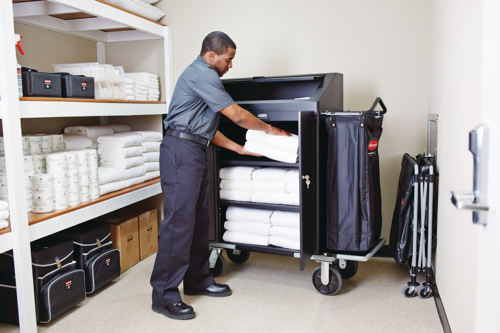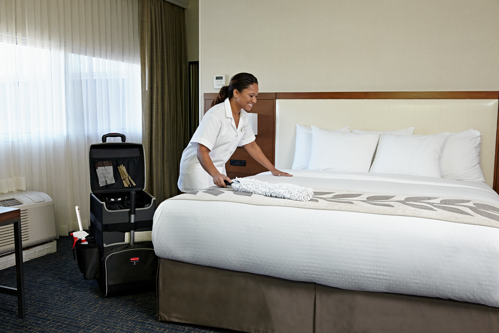
No matter what time of year it is, people from all over come to the Land Down Under, as tourism has really kicked into high gear in recent years. In 2023, for example, more than 5.4 million people visited Australia, according to data compiled by the Australian Government. Millions of these same individuals booked guest rooms in area hotels.
That's an awful lot of people who check in and check out, whether their visits are for a weekend, week or lengthier stay. Perhaps no one knows this better than your hotel housekeeping staff, who are tasked with sprucing up suites before, during and after each family or couple is in town. Some guests are tidier than others, but whether they're neatniks or more on the messy side, housekeeping chores have to get done — and done quickly, without compromising on quality.
How can you ensure that your hotel housekeeping department not only keeps up with guest turnover but also meets the highest standards of cleanliness, comfort and positive guest experience? In this comprehensive blog, we'll cover what you need to know about hotel housekeeping duties and how to improve your housekeeping operations.
The housekeeping team is the foundation of a hotel’s operations. They make sure visitors have a clean, well-organised and pleasant stay. This means their responsibilities extend way beyond just cleaning — they are essential in creating a friendly and comfortable atmosphere and improving guest satisfaction.
Key duties include:
Vacuuming, dusting, preparing beds and cleaning bathrooms.
Replenishing the guest supplies, such as towels, toiletries and other necessities.
Ensuring the hotel's high standards are met in public areas and every hotel room.
Cleaning and arranging common spaces including lobbies, corridors and meeting rooms.
Regularly emptying rubbish and recycling containers.
Reporting maintenance issues, such as damaged appliances or lighting fixtures.
Restocking housekeeping carts with cleaning products and linens.
Hotel housekeepers can find the role physically demanding, with a lot of standing, bending and lifting, but it's pleasant to know that your efforts contribute to a clean, comfortable stay for hotel guests — especially when it comes to balancing efficiency and attention to detail during busy periods.
Having the right equipment is crucial for maintaining a clean hotel and running operations efficiently. The housekeeping team can't do their jobs well and keep the place spotless for hotel guests unless they have durable, effective equipment. Must-have items include:
Vacuum cleaners for efficient and rapid cleaning.
Housekeeping carts for cleaning products to keep them neat and easy to reach.
Microfiber towels and dusters to prevent the spread of filth and dust.
Effective disinfectants formulated for use on a variety of surfaces.
If you're looking for trusted cleaning solutions, look no further than Rubbermaid — a top brand in the hospitality industry. To make hotel housekeeping operations more efficient, consider these products:
Executive Full Size Housekeeping Carts for managing larger workloads efficiently.
Professional Light Commercial Housekeeping Carts for mid-sized needs.
Quick Carts for smaller, more mobile housekeeping tasks.
Once you have all the products and tools you need, the next step is to focus on making sure you apply them correctly. Here are a few things to consider to make your hotel housekeeping top-notch:
Aside from the sanitation aspect of housekeeping, cleaning up after guests enhances organisation and reduces the chaos associated with clutter and messiness. Your staff's ability to make this possible won't go very far if they aren't organised themselves. That's why it's important for them to have all the equipment, cleaning products and tools at the ready as soon as they need them. This is made possible by colour coding certain products, labelling them or suggesting locations for where to place them on portable carts so staff members don't have to search for them every time. As we all know too well, time management is crucial in housekeeping.
Your housekeeping crew has likely already established a cleaning routine that works for them, but they're bound to enter a suite of an occupant whose living habits take them out of that routine, such as spending more time getting the bathroom in order, for example. To ensure that they don't neglect the other elements of what makes for good housekeeping, consider drawing up a checklist. This can serve as an effective reminder so nothing gets overlooked, enhancing quality control.
While mopping may not need to be done daily — ideally every other day — it should always be paired with a broom or a vacuum. The reason for this is it's easy to overlook crumbs, specks of dirt or debris during spot checks. However, those particles become glaringly apparent once the floor gets wet with soap and water. Ensure every housekeeper in your team gets into the habit of sweeping before mopping up so they don't have to do it over again.
Additionally, instead of making this their first chore, do it last. Otherwise, they may end up creating more work for themselves by sponging or clearing off surfaces, causing dirt or crumbs to fall onto the floor they’ve already vacuumed or mopped.
Your staff is bound to come upon blemishes, smudges and swirl marks that won't go away on the initial spray. There may be many reasons as to why, but it could be that they're just not allowing the cleanser to work its magic before wiping it up. Aside from the fact that time allows cleaning agents to more effectively sanitise the troublespot, it also helps remove it from the surface. Giving the products 20 to 30 seconds to work makes messes easier to eliminate and reduces effort. They may want to do this by spraying all the surfaces first (e.g., bathtubs, vanity, towel racks, etc.) and then wiping them down in the same order they were sprayed.
Dust is the bane of hotel housekeeping; no matter how often you spray surfaces with polish, it always comes back — especially during allergy season when pollen finds its way through open windows. Instead of constantly using polishing agents, have your staff grab that duster and dust away. A good once-over can be all that's necessary to keep surfaces sparkling. Also, be sure they attack those areas that are easy to overlook, like lightbulbs, lampshades and curtains. Dust accumulates quickly, making for an unsightly mess that guests will almost certainly notice.
If there's one thing everyone loves, it's fresh air. The closed quarters of a hotel can lead to stale air very quickly, especially when temperatures are frigid. Whether it's hot or cold, staff members should open the windows to air out the guest room. They can determine how wide to open them using their best judgement, but doing so improves ventilation and eliminates the scents associated with strong cleaning agents. Those smells are usually pleasant, but they can also be bothersome to guests who may be sensitive to certain chemicals or aromas. Just be sure to close the windows once you're finished.
When it comes to keeping a hotel clean, it's all about doing what's best and not making the same mistakes repeatedly. If cleaning teams want to provide guests with first-rate service, they should follow these simple rules:
Always wear protective gear, such as gloves, and practise good personal hygiene when cleaning.
Follow cleaning procedures and make sure nothing is missed and that all jobs are done consistently.
Give priority to locations that are visible to guests, prioritising the highly visible areas, such as the lobbies and guest rooms.
Make a noise and knock before you step inside a hotel room, and be considerate of guests' privacy.
Get all the corners and nooks cleaned, such as vents, light fixtures and corners.
Keep all necessities, such as towels and toilet paper, stocked at all times.
Notify hotel management of any problems with maintenance such as damage, stains or other issues.
Always carefully clean remote controls, light switches and door handles; don't rush through high-touch areas.
Don't neglect dusting; make sure baseboards and lampshades are clean to prevent a bad impression.
To keep guests comfortable, steer clear of strong-smelling cleaning solutions and choose gentle or unscented alternatives.
Make sure that guests' personal belongings and space are respected; don't use them.
Don't miss your allotted breaks; getting enough sleep is essential for focusing and avoiding errors.
Keep in mind that collaboration is essential; work well with others to accomplish jobs quickly.
Always abide by posted signage and guest preferences; don't disregard "Do Not Disturb" signs.
Housekeeping in a hotel is most effective when staff are well-organised, utilise the right cleaning products and prioritise the comfort of their guests. Your team will have no trouble producing outstanding results with the help of Rubbermaid's dependable products.
Browse products to improve hotel housekeeping and see how Rubbermaid can support your housekeeping team today.